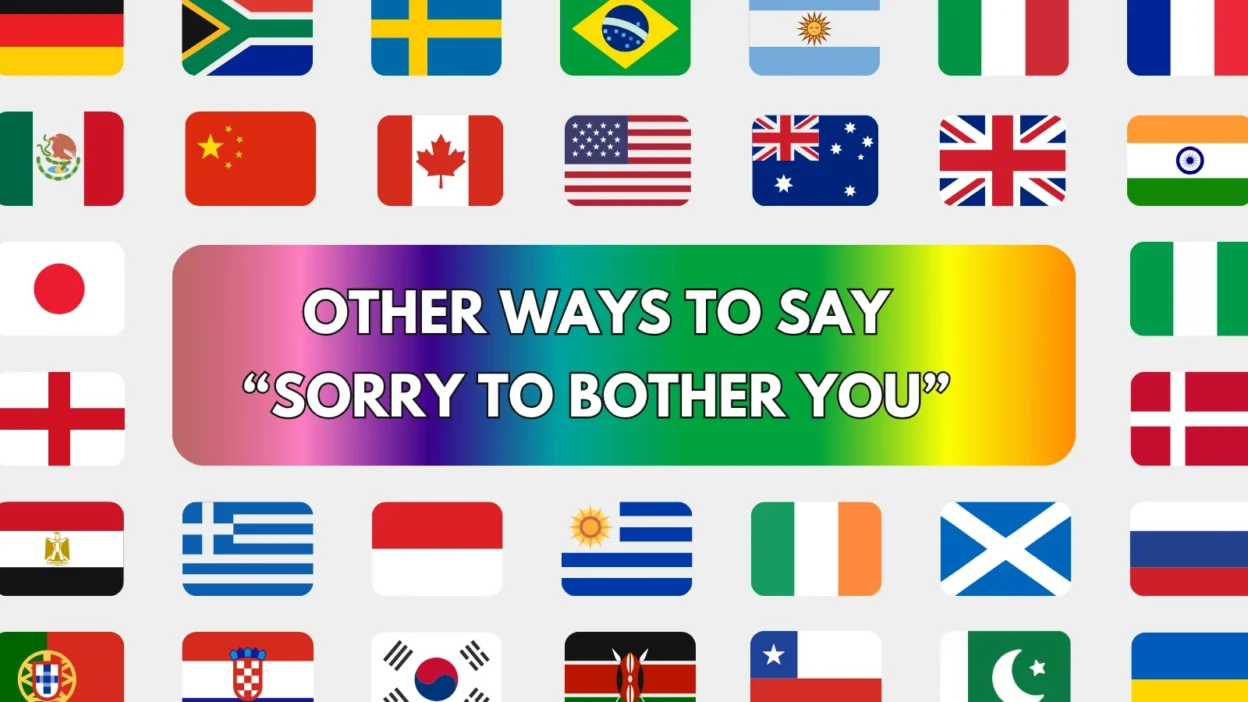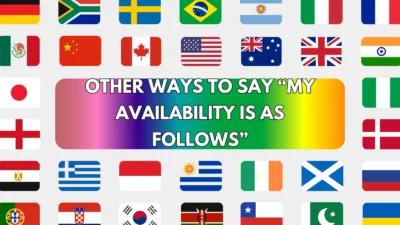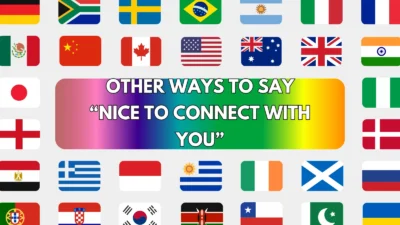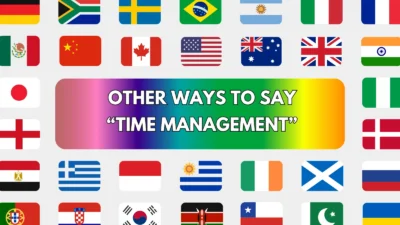The phrase “Sorry to bother you” is a polite way to acknowledge that you might be interrupting someone’s time or attention. It shows respect, courtesy, and awareness of the other person’s space.
Whether you’re asking for help, clarification, or permission, using variations of this phrase can make your tone sound more natural, considerate, or professional.
Here are 25 alternative ways to say “Sorry to bother you,” complete with meanings, detailed explanations, examples, best uses, and tone suggestions.
1. I hope I’m not interrupting
Meaning: A gentle way to check if it’s a good time to talk.
Detailed Explanation: Shows consideration for the person’s time and attention.
Scenario Example: I hope I’m not interrupting, but could I ask you something quickly?
Best Use: Professional or casual settings.
Tone: Polite, respectful.
2. I hope this isn’t a bad time
Meaning: Expresses awareness that the other person might be busy.
Detailed Explanation: Works well before making a request or starting a conversation.
Scenario Example: I hope this isn’t a bad time, but I wanted to discuss the project update.
Best Use: Professional emails, phone calls.
Tone: Thoughtful, polite.
3. Sorry to trouble you
Meaning: A classic and formal way to express mild apology.
Detailed Explanation: Polite and neutral, commonly used in emails or requests.
Scenario Example: Sorry to trouble you, but could you review this file when you get a chance?
Best Use: Business communication or polite requests.
Tone: Formal, courteous.
4. I don’t mean to intrude
Meaning: Expresses that you respect someone’s privacy or boundaries.
Detailed Explanation: Useful in sensitive or personal situations.
Scenario Example: I don’t mean to intrude, but I wanted to check if you’re okay.
Best Use: Personal conversations or delicate contexts.
Tone: Gentle, considerate.
5. I hope I’m not being a bother
Meaning: Shows humility and politeness when seeking attention or help.
Detailed Explanation: Adds warmth and self-awareness to your tone.
Scenario Example: I hope I’m not being a bother, but could you please explain that again?
Best Use: Friendly or casual interactions.
Tone: Kind, modest.
6. I know you’re busy, but…
Meaning: Acknowledges the person’s workload before asking something.
Detailed Explanation: Softens the request by showing empathy.
Scenario Example: I know you’re busy, but could you help me with this quick question?
Best Use: Professional or workplace communication.
Tone: Respectful, empathetic.
7. Pardon the interruption
Meaning: A courteous and formal apology for breaking into someone’s time.
Detailed Explanation: Ideal for meetings or professional discussions.
Scenario Example: Pardon the interruption, but I’d like to add a quick point.
Best Use: Business or formal settings.
Tone: Polite, professional.
8. Excuse me for disturbing you
Meaning: A respectful way to acknowledge a small inconvenience.
Detailed Explanation: Often used in professional communication or customer service.
Scenario Example: Excuse me for disturbing you, but could I have a moment of your time?
Best Use: Emails, polite interactions.
Tone: Formal, gentle.
9. I don’t want to take up too much of your time
Meaning: Shows respect for the person’s schedule.
Detailed Explanation: Great for meetings, requests, or brief check-ins.
Scenario Example: I don’t want to take up too much of your time, but could we go over this?
Best Use: Workplace or formal settings.
Tone: Polite, respectful.
10. I appreciate your time
Meaning: Emphasizes gratitude instead of apology.
Detailed Explanation: Makes your tone positive and professional.
Scenario Example: I appreciate your time — I just had a small question about the report.
Best Use: Emails or respectful conversations.
Tone: Positive, appreciative.
11. Sorry to take your time
Meaning: A modest apology for needing someone’s attention.
Detailed Explanation: Suitable for when you need quick help or feedback.
Scenario Example: Sorry to take your time, but could you guide me on this issue?
Best Use: Workplace or polite communication.
Tone: Gentle, apologetic.
12. I hate to bother you, but…
Meaning: Softens a request while acknowledging it might be inconvenient.
Detailed Explanation: Friendly and natural in tone.
Scenario Example: I hate to bother you, but could you look at this for a minute?
Best Use: Informal yet polite conversations.
Tone: Friendly, considerate.
13. I don’t want to inconvenience you
Meaning: Expresses concern about disturbing or burdening someone.
Detailed Explanation: Works well for formal messages.
Scenario Example: I don’t want to inconvenience you, but could you review this document?
Best Use: Professional or formal tone.
Tone: Respectful, polite.
14. I hope I’m not overstepping
Meaning: Shows care not to cross boundaries.
Detailed Explanation: Useful when giving feedback or asking a delicate question.
Scenario Example: I hope I’m not overstepping, but may I suggest another approach?
Best Use: Diplomatic or sensitive discussions.
Tone: Respectful, cautious.
15. I hope you don’t mind me asking
Meaning: A polite introduction before asking a question.
Detailed Explanation: Keeps your tone soft and conversational.
Scenario Example: I hope you don’t mind me asking, but how did you handle that issue?
Best Use: Personal or semi-formal conversations.
Tone: Friendly, polite.
16. I just wanted to check in
Meaning: A polite, non-intrusive way to start communication.
Detailed Explanation: Often used to follow up without sounding demanding.
Scenario Example: I just wanted to check in to see if there’s any update.
Best Use: Emails, professional communication.
Tone: Neutral, courteous.
17. I hope you’re not too busy for this
Meaning: A considerate way to introduce a request.
Detailed Explanation: Balances apology and understanding of someone’s time.
Scenario Example: I hope you’re not too busy for this, but I’d love your opinion.
Best Use: Friendly professional conversations.
Tone: Polite, understanding.
18. Sorry to interrupt your day
Meaning: A casual, friendly way to acknowledge an interruption.
Detailed Explanation: Best for informal conversations or quick questions.
Scenario Example: Sorry to interrupt your day, but could you sign this form?
Best Use: Casual, everyday interactions.
Tone: Warm, light.
19. I didn’t mean to bother you
Meaning: A natural and genuine apology for unintentional disturbance.
Detailed Explanation: Good for informal or after-the-fact apologies.
Scenario Example: I didn’t mean to bother you earlier — thank you for your patience.
Best Use: Casual or follow-up conversations.
Tone: Honest, humble.
20. I’ll be brief
Meaning: Quickly reassures the person that you won’t take long.
Detailed Explanation: Works well before making short requests or statements.
Scenario Example: I’ll be brief — I just need your signature on this document.
Best Use: Meetings, calls, quick chats.
Tone: Respectful, efficient.
21. I hope this message finds you well
Meaning: A formal and polite opening in written communication.
Detailed Explanation: Shows professionalism and good manners.
Scenario Example: I hope this message finds you well. I wanted to ask about the proposal.
Best Use: Business emails or letters.
Tone: Formal, courteous.
22. I appreciate your patience
Meaning: Focuses on gratitude instead of apology.
Detailed Explanation: Softens a delay or interruption gracefully.
Scenario Example: I appreciate your patience while I explain this.
Best Use: Professional or personal contexts.
Tone: Positive, professional.
23. Thanks for your understanding
Meaning: A polite way to close after a minor inconvenience.
Detailed Explanation: Shows appreciation for someone’s flexibility or tolerance.
Scenario Example: Thanks for your understanding — I know your time is valuable.
Best Use: Emails, messages, or follow-ups.
Tone: Appreciative, polite.
24. Sorry for the interruption
Meaning: A quick apology for breaking into someone’s focus.
Detailed Explanation: Useful in group discussions or meetings.
Scenario Example: Sorry for the interruption, but may I add something?
Best Use: Professional meetings or presentations.
Tone: Polite, brief.
25. I hope it’s okay to reach out
Meaning: A friendly and polite way to start a message or call.
Detailed Explanation: Expresses courtesy when contacting someone unexpectedly.
Scenario Example: I hope it’s okay to reach out — I wanted to ask a quick question.
Best Use: Emails, networking, messages.
Tone: Friendly, respectful.
Conclusion
“Sorry to bother you” is a thoughtful phrase that shows you value someone’s time — but there are many polite and natural alternatives that suit different tones and contexts.
Whether you’re writing a formal email or having a friendly chat, phrases like “I hope I’m not interrupting” or “I don’t want to take up too much of your time” help you sound considerate and respectful. By choosing the right expression, you can stay polite while keeping your communication smooth and confident.

Naz Fatima is an author at Saypadia who specializes in writing clear, relatable, and reader-friendly content about language, expressions, and modern terminology. She enjoys breaking down meanings with real-life context so readers can quickly understand and apply them. Naz’s work reflects a strong commitment to clarity, accuracy, and helping users find quick answers without confusion.




